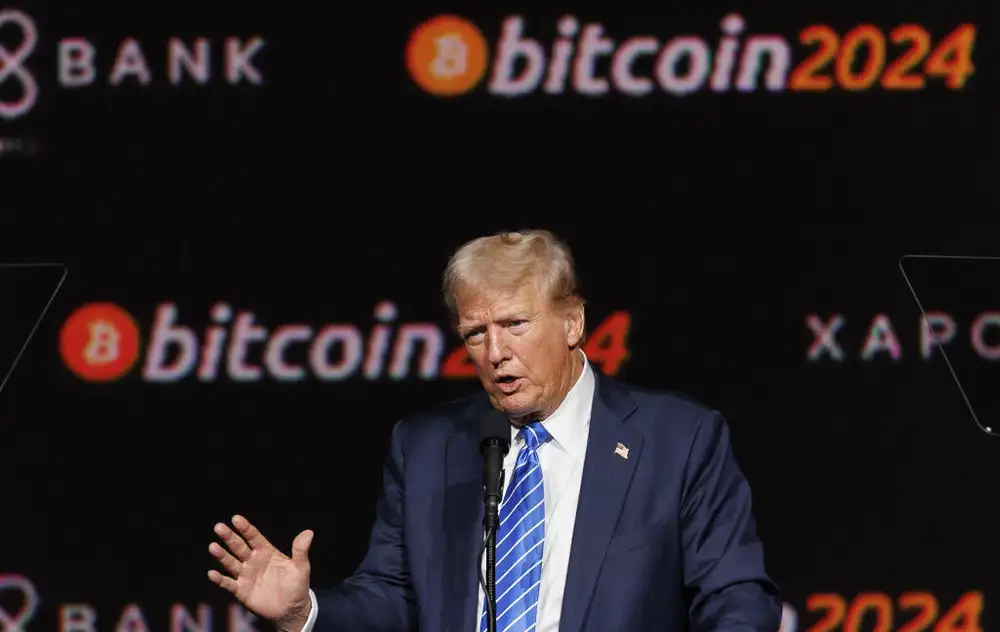Critics have long warned that Donald Trump's pro-cryptocurrency push as president, coupled with his links to his family's growing crypto empire, creates substantial conflicts of interest that must be probed.
But so far, nothing has stopped Trump's family from seemingly benefiting from the presidency while expanding their empire. And now, Trump is rushing regulation through Congress that many Democrats fear could create his biggest conflict of interest yet.
On Tuesday, the Senate passed the GENIUS Act, a bill that will regulate stablecoins in the US, establishing guardrails and consumer protections that may spur wider crypto adoption nationwide. Unlike more volatile forms of cryptocurrency—like Trump's controversial memecoin—stablecoins' value can be pegged to the US dollar. The crypto industry is hoping the House of Representatives will quickly send the bill to Trump's desk, which Trump has demanded happen by August.
Although the stablecoin legislation prohibits "any member of Congress or senior executive branch official from issuing a payment stablecoin product during their time in public service," the bill does not stop Trump from benefiting from his prior deal backing crypto firm World Liberty Financial, which recently issued its own stablecoin.
Some Democrats are concerned that failing to prohibit Trump's links to the recently issued stablecoin could make it easier for Trump to use his own stablecoin to possibly hide payouts or bribes in exchange for favors such as eliminating tariffs or granting presidential pardons.
Senators are already attempting to probe a Trump-connected crypto deal they view as a "clear" conflict of interest. After World Liberty Financial launched a stablecoin called USD1, Trump seemingly profited when an Abu-Dahbi-based investment firm, MGX, used USD1 to "make a $2 billion investment in crypto exchange Binance, putting Trump’s company in a position to profit from the deal," ABC News reported.
In a letter to MGX and World Liberty Financial, Sens. Elizabeth Warren (D-Mass.) and Jeff Merkley (D-Ore.) asked what explanation MGX could possibly have to use USD1 over other more established cryptocurrencies, other than to curry favor with Trump.
"Why—beyond the obvious benefit of gaining favor, directly or indirectly, with the Trump administration—did you select USD1, a newly launched, untested cryptocurrency with no track record?" the senators asked.
Responding, World Liberty Financial's lawyers claimed MGX was simply investing in "legitimate financial innovation," CBS News reported, noting a Trump family-affiliated entity owns a 60 percent stake in the company.
Trump has denied any wrongdoing in the MGX deal, ABC News reported. However, Warren fears the GENIUS Act will provide "even more opportunities to reward buyers of Trump’s coins with favors like tariff exemptions, pardons, and government appointments" if it becomes law.
Although House supporters of the bill have reportedly promised to push the bill through, so Trump can sign it into law by July, the GENIUS Act is likely to face hurdles. And resistance may come from not just Democrats with ongoing concerns about Trump's and future presidents' potential conflicts of interest—but also from Republicans who think passing the bill is pointless without additional market regulations to drive more stablecoin adoption.
Dems: Opportunities for Trump grifts are “mind-boggling”
Although 18 Democrats helped the GENIUS Act pass in the Senate, most Democrats opposed the law over concerns of Trump's feared conflicts of interest, PBS News reported.
Merkley remains one of the staunchest opponents to the GENIUS Act. In a statement, he alleged that the Senate passing the bill was essentially "rubberstamping Trump's crypto corruption."
According to Merkley, he and other Democrats pushed to remove the exemption from the GENIUS Act before the Senate vote—hoping to add "strong anti-corruption measures." But Senate Republicans "repeatedly blocked" his efforts to hold votes on anti-corruption measures. Instead, they "rammed through this fatally flawed legislation without considering any amendments on the Senate floor—despite promises of an open amendment process and debate before the American people," Merkley said.
Ultimately, it passed with the exemption intact, which Merkley considered "profoundly corrupt," promising, "I will keep fighting to ban Trump-style crypto corruption to prevent the sale of government policy by elected federal officials in Congress and the White House."
Warren similarly sounded alarms, arguing on the Senate floor that "a bill that turbocharges the stablecoin market, while facilitating the President's corruption and undermining national security, financial stability, and consumer protection is worse than no bill at all."
Lawmakers need only mull the MGX-Binance deal to understand the potential conflicts of interest, Merkley and Warren suggested. The senators have alleged that Trump, his family, and the family of an associate—Special Envoy to the Middle East Steve Witkoff—all stood to "receive hundreds of millions of dollars in foreign kickbacks" from the MGX deal alone.
It's possible that more will be revealed about feared conflicts of interest in that deal. In May, the senators sent another letter urging the Office of Government Ethics acting director, Jamieson Greer, to investigate why "a crypto firm whose founder needs a pardon"—Binance's Changpeng Zhao (also known as "CZ")—"and a foreign government spymaker coveting sensitive US technology"—United Arab Emirates-controlled MGX—"plan to pay the Trump and Witkoff families hundreds of millions of dollars."
"The opportunities for grift—in which the Trump Administration offers favors to the UAE or to Binance in exchange for their massive payouts—are mind-boggling," the Senators suggested.
GENIUS Act may not pass in the House
In the House, the GENIUS Act is expected to be revised, so it's unclear if the alleged conflicts of interest could be addressed before the law reaches Trump's desk.
It's possible that the bill won't pass at all, as Democrats continue to push for more anti-corruption measures. Additionally, House Republicans are divided on whether they should lump the bill into a bigger push to clarify stablecoin policy beyond the GENIUS Act. That bigger push is reportedly likely to receive more pushback from Democrats, though, which could stall the bill before Democrats' concerns over conflicts of interest are realized.
That would surely be a relief to Warren and Merkley, but it seemingly wouldn't end Trump's perceived conflicts of interest. In their letter to Greer, they warned that the MGX deal using a Trump-affiliated stablecoin may have violated the Constitution, while "making the federal government highly vulnerable to foreign influence and increasing the potential for a quid pro quo that could endanger national security."
"The launch of a stablecoin directly tied to a sitting President who stands to benefit financially from the stablecoin's success is an unprecedented conflict of interest presenting significant threats to both our financial system and our democracy," Warren alleged.

